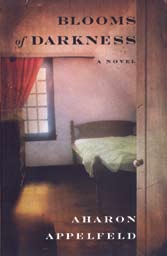
BLOOMS OF DARKNESS
By Aharon Appelfield
Translated by Jeffrey M. Green Schocken. 2010.
Reviewed by Helen Schary Motro
"You're not guilty. The circumstances are guilty," says eleven year old Hugo to the Christian prostitute who is saving his Jewish life.
Hugo, coddled child of cultured pharmacists in an unnamed central European country, grows up playing the violin, learning German, and looking forward to family vacations in the mountains. In an idyllic childhood surrounded by love, his biggest worry is living up to his parents' and teachers' expectations. As the story opens the war is already advanced, hunger prevails in the ghetto, and his father has been deported to an unknown destination.
The noose grows tighter, Hugo's gentle mother searches in vain for a peasant whom she can pay to hide her only son. But she finds only one person willing: her morally compromised childhood friend Mariana who lives in a brothel that thrives on servicing German troops.
As a last resort and with heavy misgivings, his mother leaves Hugo with Mariana, making him promise to do his arithmetic problems, play chess with himself, and write compositions. All this he is to do while he lives hidden in Mariana's closet, ignorant of her occupation. For many months he feels the presence of his parents with him and awaits their ultimate reunion. Lethargy overwhelms him, and try as he might he is unable to practice any sums or write even a single word. As he lies in the closet amidst Mariana's fragrant clothes, he hears the puzzling sounds of Mariana and her customers – shouts, murmurs, moans.
Mariana brings Hugo warm milk and decorated sandwiches, she lets him out to explore her room full of perfume bottles and cushions. She calls him her darling puppy. She shares with him her unhappy past abused by a cruel father, her mood swings, her neurotic dependence on brandy.
Gradually, as Hugo matures towards puberty, Mariana seduces him, first just tactile togetherness, and then total sexual contact. Mariana repeats that she has finally found someone who truly loves her. Hugo becomes enraptured, erotically and emotionally captivated, as thoughts of his parents and his old life recede into the unreality of dreams. When her clients leave, she unlocks the closet and they sleep entwined in each other's arms. Their intimacy increases:
"The cold in the closet is unrelenting. Mariana often comes late with Hugo's cup of milk in the morning, and sometimes she goes into town and forgets him all day long. But sometimes she says, 'Come to Mariana, and she'll hug you, darling,' and so she brings him from the cold darkness to her vibrant breast. In the hours he spends in her bed, embraced in her long arms, marvelous oblivion envelops him".
Judged by normal parameters, Mariana's conduct is reprehensible sexual perversion and child abuse. But it must be seen against the ironic reality: by hiding the Jewish boy Mariana risks her own life every moment. She is at once his savior and the corruptor of his youth. Her dependence on Hugo's pure adoration is an expression of her own utter loneliness as a social pariah. Hence when Hugo repeats the words he had heard at home – "Circumstances are guilty" – he is more prescient than he knows.
Meanwhile, outside, the hunts for the Jews continue, ever more lethally, with informers encouraged to turn them in for bounty. Little by little the secret of Hugo's presence becomes known to others in the brothel.
The tide of war turns: the Germans retreat and the Russians advance. But for Mariana liberation is not liberation: it means that she herself turns into the prey. For having slept with German soldiers she is hunted down as a collaborator. Hugo accompanies his beloved Mariana as she flees. Later he returns to his town to wait in vain for his parents’ return.
"The sight of the pharmacy changes everything. The elegant building … has become a grocery store. Inside, the tall and gleaming cabinets, the marble counter, the vases of flowers – all have been uprooted. At the entrance stand crates of potatoes, red cabbage, garlic, and onions. The smell of smoked fish and rotten cabbage hangs in the air. The pharmacy was one of Hugo's favorite places. His parents felt complete fulfillment there. Their love flourished … Only now, standing before the ruins, does he absorb what has happened: what was will never return."
In limpid understated prose Appelfeld creates a mesmerizing story of individual tragedy within the greater tragedy, of a young boy's heartbreaking tale of being saved and lost at the same time. Appelfeld makes the reader long to save Hugo, to hold him, to protect him from the ugly reality everyone except he knows awaits - the unforgiving and ugly new world bereft of all he has loved and who loved him.
 DEAR EDITOR 157 MAGAZINE
DEAR EDITOR 157 MAGAZINE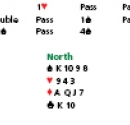 COUNTING ON INFERENCE
COUNTING ON INFERENCE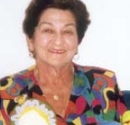 SHULAMIT LAMIE RAVINSKY 1925-2010
SHULAMIT LAMIE RAVINSKY 1925-2010 Robert Kwong at the Yeshiva
Robert Kwong at the Yeshiva 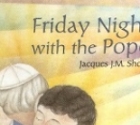 Friday Night with the Pope - A Book Review
Friday Night with the Pope - A Book Review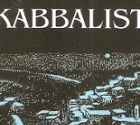 The Kabbalist - A Book Review
The Kabbalist - A Book Review  Helen Schary Motro
Helen Schary Motro